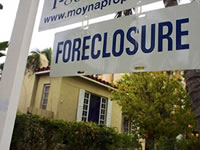Fannie Mae and Freddie Mac
Refinance
Trouble Hits GSE Giants Fannie Mae and Freddie Mac
by Nancy Osborne, COO of ERATE®
July 23, 2008 - The two government sponsored enterprises (or GSEs), Fannie Mae and Freddie Mac, own or insure about 50% of the nation's $12 trillion in home loans. The two agencies combined also accounted for almost 80% of all mortgage securities created in the first quarter of the year. Share prices of Fannie Mae fell 58% and Freddie Mac fell about 71% to their lowest level in 17 years as almost one in every 500 homes in the U.S. have found their way into some stage of the foreclosure process. Asset write-downs and credit losses totaling $452 billion have filtered throughout the lending and investment communities and it now appears that the GSE giants themselves have fallen into trouble right along with the banks and investment firms as Fannie Mae and Freddie Mac have developed their own capital adequacy issues with combined losses estimated at some where around $48 billion by the year 2009. Privately issued securities backed by so-called non-agency loans may amount to a combined total of 15% of both the GSE's portfolios. This may be reflective of why the GSEs had been hesitant to extend themselves into new loan territory by stretching the conforming loan limit to the now authorized $729,750 maximum which was approved by Washington earlier this year. As a result of their mounting solvency issues both GSE giants may be left in the position of having to cut back on the quantity of their loan purchases in hopes of stabilizing their own balance sheets in the backdrop of record mortgage delinquencies and foreclosures. The two GSEs, which have the implicit backing of the government and as a result have access to funds at rates only slightly higher that of the U.S. Treasury, rates which are far lower than that of their non-GSE (or non-government chartered) competitors. The importance of Fannie Mae and Freddie Mac has grown as the private lending sector of the market has destabilized. With housing considered a main driver of the economy, the Treasury Department has been given the authority by Congress to assist the GSEs when necessary. In mid-July the government unveiled a plan to provide unlimited government loans to both GSEs by expanding its line of credit to the two companies and has also been granted permission to acquire the stock of both Fannie Mae and Freddie Mac as needed and is designed to serve a backstop to the housing credit crunch. The Fed has also granted the Federal Bank of New York authority to extend loans to both the GSEs. However concerns about the plan have been expressed as U.S. taxpayers may have been placed at risk in the process of extending this unprecedented assistance as estimates of potential bailout costs run as high as $25 to $100 billion.
 Nancy Osborne has had experience in the mortgage business for over 20 years and is a founder of both ERATE, where she is currently the COO and Progressive Capital Funding, where she served as President. She has held real estate licenses in several states and has received both the national Certified Mortgage Consultant and Certified Residential Mortgage Specialist designations. Ms. Osborne is also a primary contributing writer and content developer for ERATE.
Nancy Osborne has had experience in the mortgage business for over 20 years and is a founder of both ERATE, where she is currently the COO and Progressive Capital Funding, where she served as President. She has held real estate licenses in several states and has received both the national Certified Mortgage Consultant and Certified Residential Mortgage Specialist designations. Ms. Osborne is also a primary contributing writer and content developer for ERATE.
"I am addicted to Bloomberg TV" says Nancy.
Follow the link to continue reading this article.
New Rules for Fannie Mae Loans
Fannie Mae Eases Down Payment Requirement
Lost in Translation: What Does the Fannie and Freddie News Mean for You?
Bailout Required for Fannie and Freddie After All
The ABCs of Collateralized Debt Obligations & Credit-Default Swaps
Fannie Mae & Jumbo Mortgage Rates
Just One Click! = Current Rate Chart


